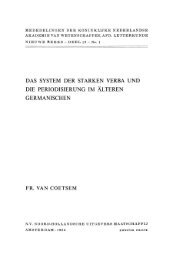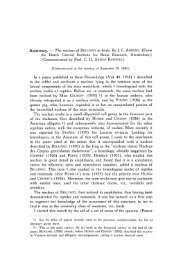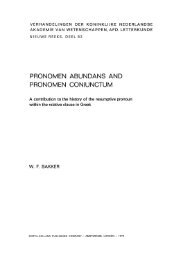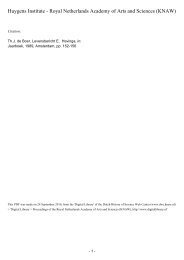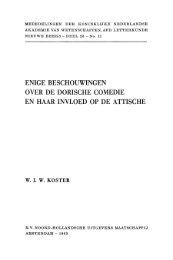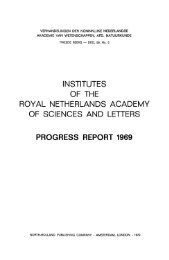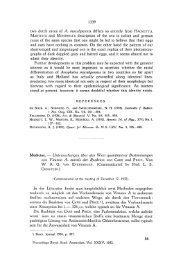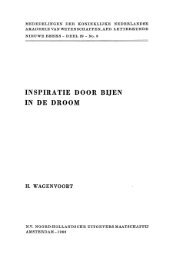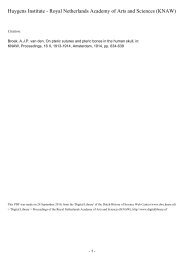Studies on Panini's grammar - DWC
Studies on Panini's grammar - DWC
Studies on Panini's grammar - DWC
Create successful ePaper yourself
Turn your PDF publications into a flip-book with our unique Google optimized e-Paper software.
The <strong>grammar</strong> of the indeclinables 27<br />
paribha~ä of 1. 4, 2 shows a great resemblance to the asiddhatva~<br />
paribhä~as 6, 1. 86; 6, 4, 22 and 8, 2, 1. all these rules referring to the<br />
mutual relati<strong>on</strong> of sütras and their applicability, that these sütras without<br />
excepti<strong>on</strong> have a restricted field of applicability (e.g. su. 6, 4,22 bears <strong>on</strong><br />
6, 4, 23-128; sü. 8, 2, 1 <strong>on</strong> 8 pä. 2-8, 4 fin ., su. 6, 1. 86 <strong>on</strong> a limited<br />
subject), and finally that sü. I, 4, 2 itself follows immediately an adhikära<br />
I, 4, 1 bearing as such <strong>on</strong> I, 4, 1-2, 2, fin. So the reader will be al most<br />
or quite c<strong>on</strong>vinced that I, 4, 2 is likewise an adhikära with the same extent<br />
of validity.<br />
Partly then su. 2 is a fuller explanati<strong>on</strong> of su. I, for whilst sü. 1 lays<br />
down the rule that in the following three pädas technical terms exclude<br />
each other, sü. 2 says more clearly that in secti<strong>on</strong> I, 4-2, 2, fin. and<br />
spedally in the pada~bha~passage (1, 4, 14"':"-20) it is a feature of composi~<br />
ti<strong>on</strong> and redacti<strong>on</strong> that definiti<strong>on</strong>s are often too wide and must be restricted<br />
by following definiti<strong>on</strong>s; e.g. sü. I, 4, 17 defines padas as word~stems<br />
before case~endings (except the sarvanämasthänas) and before denomina~<br />
tive noun~suffixes 1), but immediately af ter th is sü. 18 de fin es the bha as<br />
a word~stem before such endings and suffixes when beg inning with a<br />
vowel; strictly speaking I, 4, 1 would be suffident to solve the diHiculty,<br />
but I, 4, 2 combined with sü. 1 seems to make matters much clearer:<br />
padas are word~stems before denominative noun~suHixes and case suffixes<br />
which are no sarvanämasthänas and moreover begin with a c<strong>on</strong>s<strong>on</strong>ant.<br />
However, not <strong>on</strong>ly perhaps as a sort of comment <strong>on</strong> the preceding sütra,<br />
but certainly by itself su. I, 4, 2 is an adhikära to I, 4-2, 2 fin. and is as<br />
such particularly important for the interpretati<strong>on</strong> of the ku~gati~passage as<br />
will be afterwards shown 2).<br />
A general remark may be inserted here. Whilst the subtle argumentati<strong>on</strong><br />
with the aid of prevalence~rules seems to hàve been greatly developed<br />
under the influence of the Purva~Mïmarp.sa, the sütras of Pä~ini may be<br />
c<strong>on</strong>sidered to be an improvement up<strong>on</strong> the general sütra~style, for whilst<br />
striving for the same pregnancy as found in the Kalpa~Sütras the author of<br />
the A~tädhyayï at the same time leaves matters less to the risk and caprice<br />
of oral traditi<strong>on</strong>. On the other hand the work was not put together as a<br />
manual for foreigners, but written for scholars and teachers, thoroughly<br />
acquainted with the language. Comm<strong>on</strong> sense and general knowledge are<br />
presupposed, and the system of compositi<strong>on</strong> is not a matter of mechanica 1<br />
algebraic calculati<strong>on</strong>.<br />
§ 31. Int e r pre t a t i<strong>on</strong> 0 f th e ad hik ä ras u. 2, I, 1.<br />
Adhyäya 2 beg ins at the very outset with a pregnant and enigmatic<br />
sütra 2, I, 1 samarthal} pac/a~vidhil} = a rule about words (here: declined<br />
nouns 3) or indeclinables 4) as last member of a compound, and noun~<br />
1) See § 42 note.<br />
2) See § 49.<br />
3) SP. 1. 4, H .<br />
4) SP. 2, 4, 82 and I, I, 62 sq. with Böhtlingk's note to 62.



